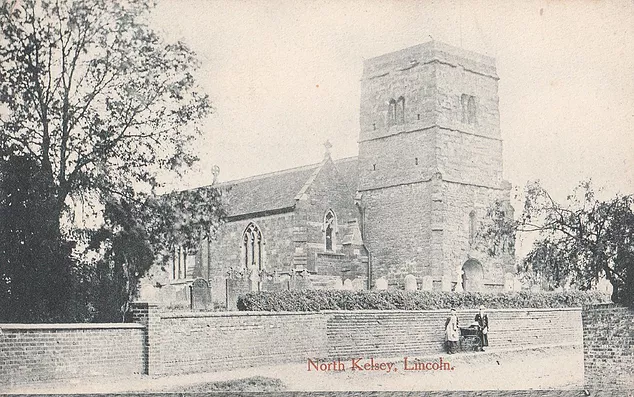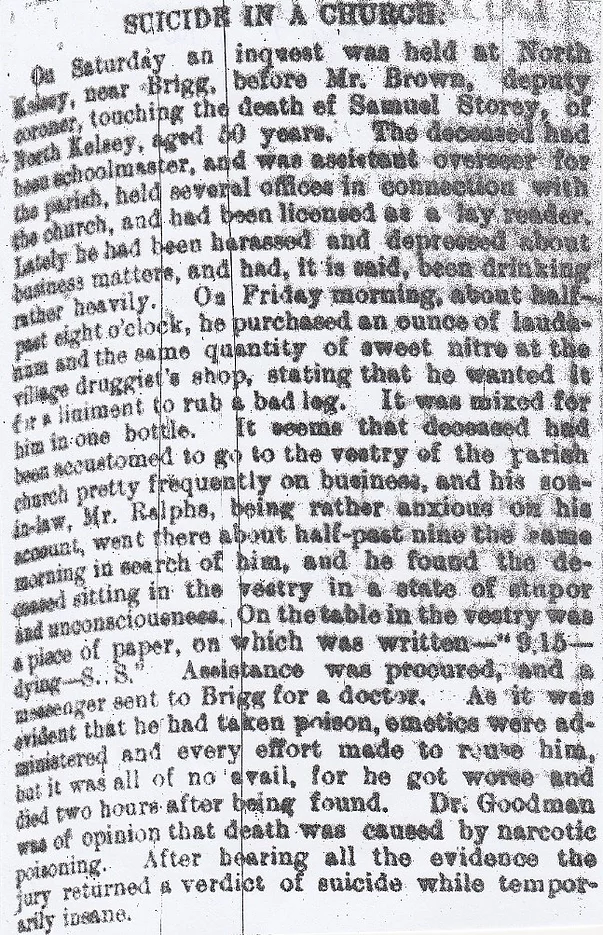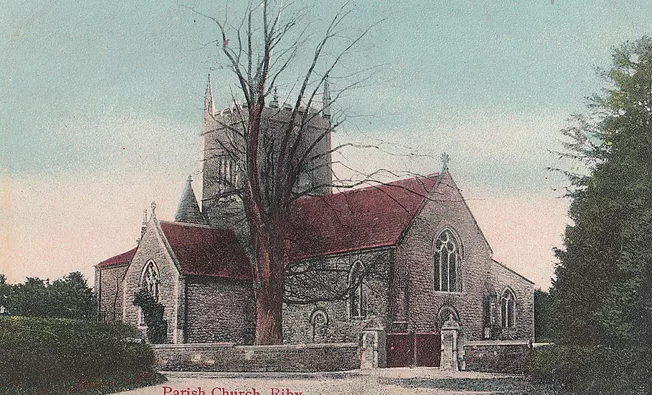1/ North Kelsey Church Suicide, August 1886.
2/ North Kelsey, March 1865 (Attacks Wife with Scythe)
Thomas Andrew aged forty-three, a labourer, was indicted for unlawfully and maliciously wounding with a scythe Elizabeth Andrew, his wife, with intent to do grievous bodily harm at North Kelsey on August 25th, 1864. Several witnesses were examined and the jury returned a verdict of guilty. He was sentenced to six months imprisonment with hard labour.
3/ North Kelsey Suicide, January 1914
John Seagrave, a farm labourer at North Kelsey, was discovered hanging from a wooden beam in his kitchen in his cottage. He was cut down, but life had already expired.
4/ North Cotes, (Grimsby/Louth) September 1887 (Body Washed Ashore)
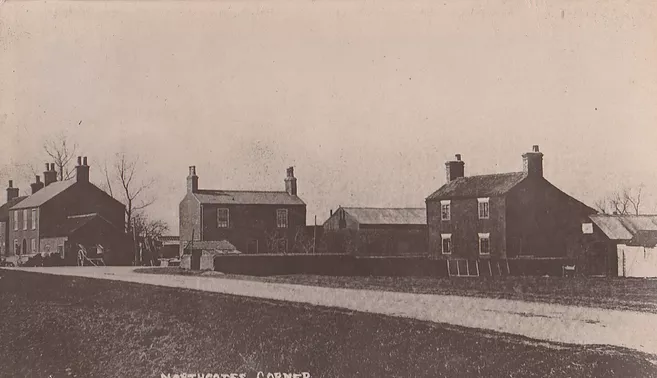
An inquest was held at the Fleece Inn, North Cotes, upon the body of a man unknown, but believed to be a person late in the naval service. Henry Jacklin deposed to finding deceased on the North Cotes sands at nine a.m. on Wednesday. Coastguard, Joseph White of Tetney Lock, identified the clothing of deceased as that of the navy. It was supposed deceased was lost off a man-of-war which was cruising off Grimsby about a month ago. A verdict of “Found Drowned” was returned.
5/ North Cotes Drowning, February 1867
Joseph Osborne aged fifty-six, was accidentally drowned in the large drain opening through a sluice into the sea. He was in a small boat breaking up the ice when his frail bark capsized. A man named Michael recovered the boat and reached Osborne, who too impatiently seized the boat, which was then overturned for the second time and now the two men were both struggling like hell. They managed to grab a rope which had been flung across the sluice, and which they supported themselves for half an hour. A passerby named Capes rescued Michael and then the two tried to rescue Osborne but he was carried under the sluice. Only a few minutes elapsed between him going under and when it was recovered on the other side, but life was extinct.
6/ North Cotes Suicide, September 1880
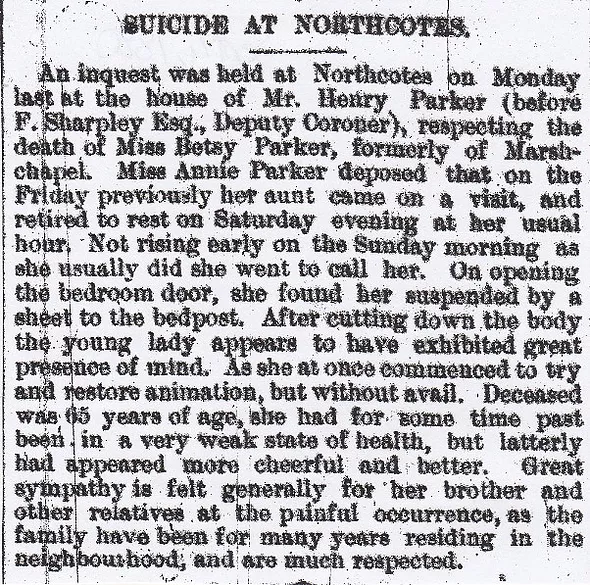
7/ North Cotes/North Somercotes, (Sailors Body Found) January 1861
An inquest was held at the Fleece Inn on the body of a sailor unknown, found on the shore. Another inquest was held at the White Horse Inn, Marshchapel, on the body of Captain Thomas Wickenden, of the “Mary Caroline” of Rochester, which was wrecked on the coast at North Somercotes a few days ago. Captain Wickenden was born in a village near Rochester and has left a widow and two children there, having previously lost three other children to scarlet fever during the past year. The body was identified by Mr Silver, of Rochester, the builder of the vessel. He was thirty-two years old and had saved the lives of shipwrecked sailor’s in the North of England no less than three times, which he obtained for, unfortunately not recovered with the body.
8/ Riby Murder, September 1870 (William Hicks the murder victim, is buried here)
The story goes, that William Marris, a husband and father of ten children, didn’t get on too well with 18-year-old William Hicks, as they worked on the same farm and there was a bit of friction owing to when Hicks took some oil-cake to feed his horses from Marris and it rankled. Marris would regularly moan about the young lad to his employer, and the other staff took the mickey out of Marris. Hicks went past Marris’s cottage one evening and he fired a gun at him from an above window hitting him in the face. The lad fell down dead.
9/ Riby Murder (Sentencing), March 1871
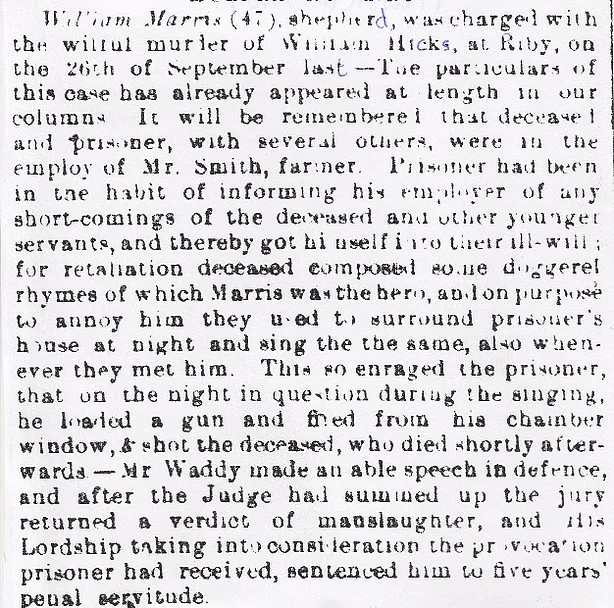
The body of young William Hicks was interred at Riby churchyard and is to the right of the church door, and a couple of graves down…It says somewhere else that Marris was sentenced to transportation to Australia, but it states five years with hard labour.
10/ Riby Fatal Accident, September 1907
George Henry Lowe was busy working on a traction engine in the village of Riby near Grimsby, when he was run over and crushed by the huge machine. A verdict of “Accidental Death” was returned. (Is he buried there?)
11/ New Holland, January 1884 (Fatal Fight)
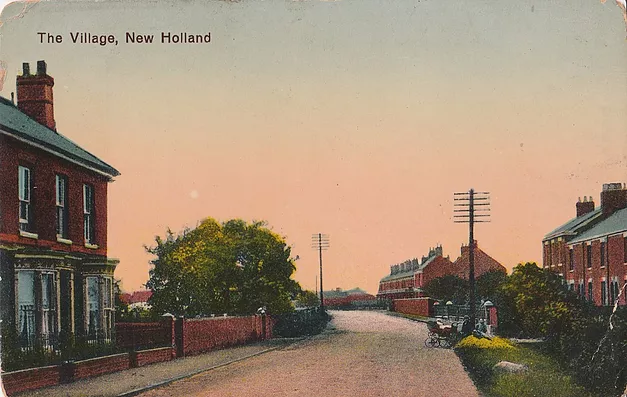
Two young men, John Longbottom aged twenty-six and nineteen-year-old Walter Harrison, both of whom worked for the M.S.& L Railway, got into a fight one night, with the elder one landing a couple of punches and the teenager smacking him once. This was at the Pelham Inn, New Holland, and the fight became a scuffle and Longbottom struck Harrison’s head on the floor. Police were called for and Longbottom was taken home, where he died a couple of days later. Harrison was later arrested by police on a charge of manslaughter.
12/ New Holland Railway, August 1865 (Fatal Accident)
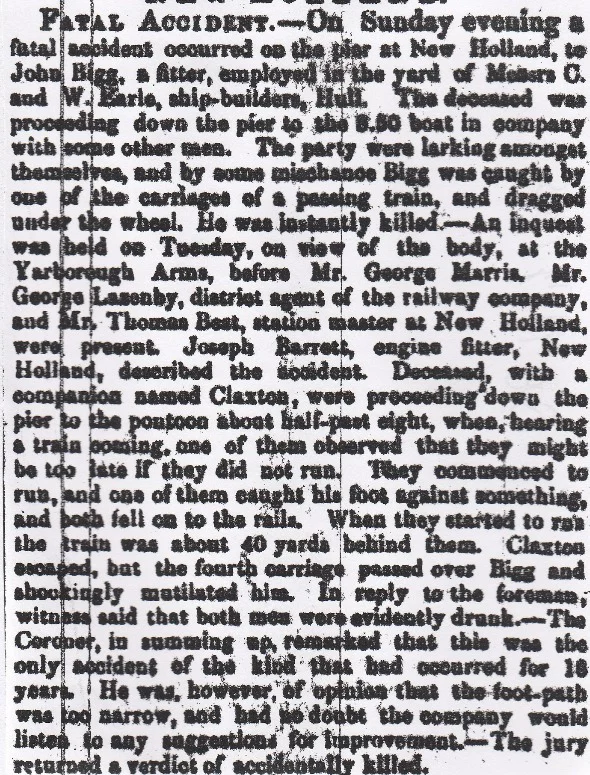
13/ New Holland Murder? April 1868
At nine p.m., a watchman on the steamer “Magna Charta” spotted a woman in the water near the railway pontoon and drifting out to sea. He got the crew to head towards the spot she had been seen flapping around in the Humber, shouting for help, but before they got there, she drowned. When they returned they found a group of blokes drunk as anything and asked around about the woman. One piped up that it was his “Poll”, who he’d been with for the past year and three of the men were given into custody on a charge of having something to do with Poll’s death. A youth saw them throw the woman into the Humber and she was being man-handled previous to this. Her full name was Polly Bishop, a 24-year-old prostitute from Hull. They came over from Hull that day and had been drinking when things got physical between her and Thomas Stamp, the boyfriend. The others involved were:- John Coleman, a fisherman, and labourer George Stathens. (Was it murder?)
New Holland Pier. Was Poll pushed off here?
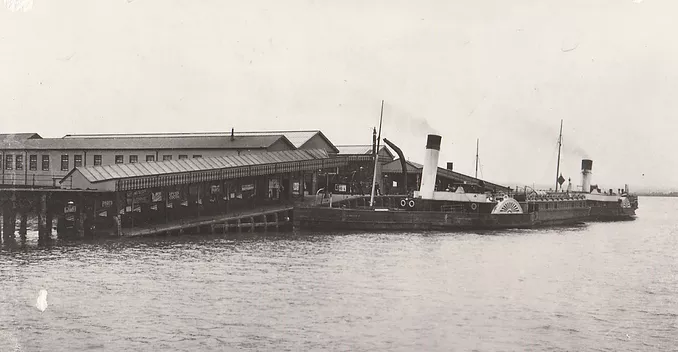
14/ New Holland, (Child Murder?) May 1869
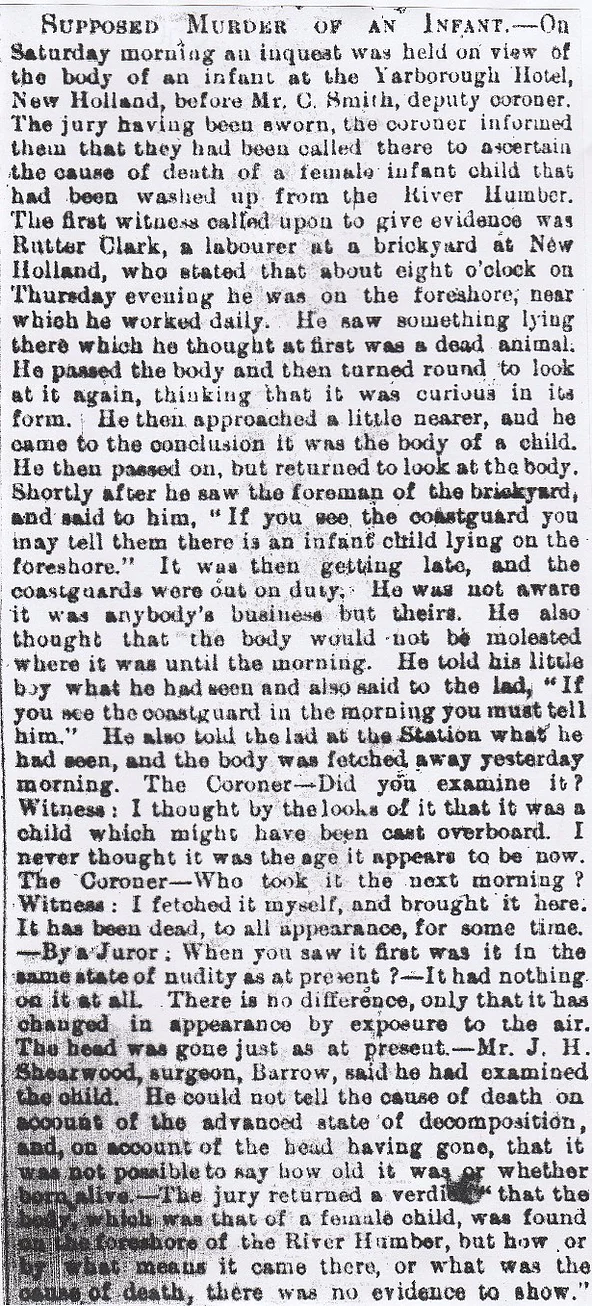
15/ Manby/Legbourne, November 1860 (Birth in Public)
Two servant girls left the house of a farmer at Manby on the morning of 23rd November, for Louth Fair ostensibly for a day’s recreation, when a short distance from that village they were overtaken by Mr Coote’s cart, with the driver asking them if they wanted a lift. They thanked him and climbed in and when the vehicle had reached Legbourne Bar, one of the girl’s wished to be put down. No sooner had she alighted on the road when she gave birth to a child. It was taken to a cottage close by and placed before the fire but gave no signs of life. The girl remained there for a few days, with an inquest was held on Monday when it was proved with a post-mortem examination that the infant had been stillborn. It is remarkable that up to the very moment of birth the girl’s pregnancy was never suspected.
16/ North Thoresby Railway Station, June 1876 (Death in Railway Carriage)
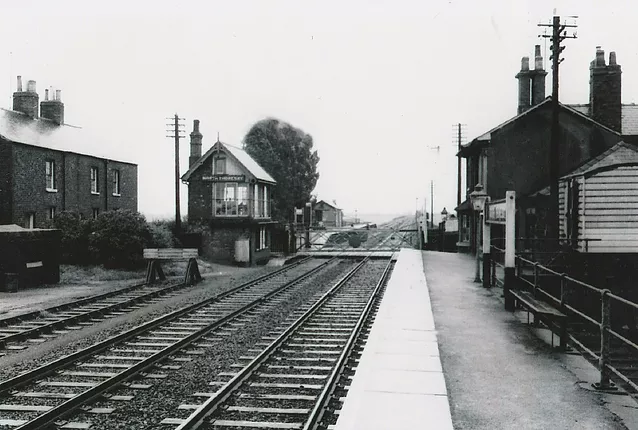
William Cook, a shoemaker from North Thoresby, died in a third-class carriage between North Thoresby and Louth. He was about sixty-four years old. He and his wife were heading to the Boston flower show and could see their daughter as well. Mr and Mrs Cook sat opposite each other and after a few minutes of leaving North Thoresby, the man sitting next to him asked if her husband suffered from fits, as he thought he was having one. When they pulled into Louth Station he was dead as a dodo. The wife said that they were a little late for the train so they hurried a little but he didn’t seem exhausted when they got there. She saw him fall back when they neared Fotherby or Utterby. The man who was next to him, William Capes, said he never spoke a word and seemed to have a fit, then five minutes later he was totally lifeless. Death from natural causes.
17/ North Thoresby Railway Station, July 1887 (Another Death in a Carriage)
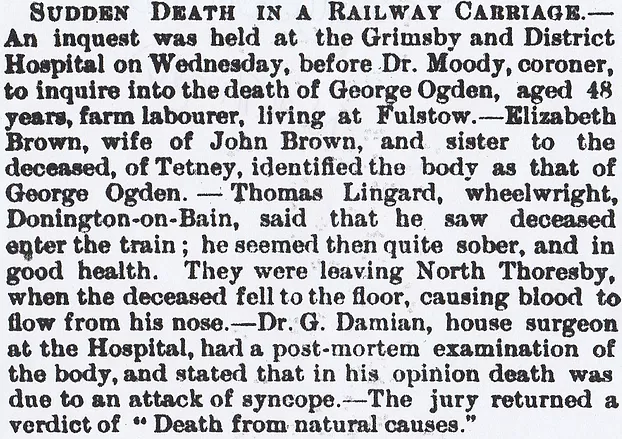
18/ North Thoresby March 1915 (Motor Accident)
Two soldiers were involved in a fatal motor accident near North Thoresby. Military motorcyclist, Bryan Fletcher of the East Yorkshire Regiment, was riding the motorcycle and Henry Robinson from Hull was in the sidecar when it overturned at high speed and they went into a dyke on the roadside. Robinson was dead on impact and Fletcher was whisked off to Grimsby Hospital with a fractured arm and several lacerations.
19/ North Thoresby, July 1868 (Concealing Birth)
An inquest was held in North Thoresby before the coroner, Thomas Sharpley, on the body of a newly-born child, the illegitimate daughter of Sarah Bradeley, who had been confined thereof in a petty adjoining her parents’ house. After hearing the evidence of witnesses the jury returned a verdict of “no evidence of live-birth”.
20/ North Thoresby, July 1881 (Heart Attack near Granby Inn)
Mary A.Hall aged fifty-three years died on the Grimsby and Louth Road about seven p.m. and died immediately. Tom Webster, a youth who worked for Mr Atkinson, an engineer at North Thoresby, was stood at the Granby Inn corner with several others when he saw her coming towards them from the direction of Ludborough. He knew her very well, she being the sister of Mr Atkinson, he walked forward about 100 yards to meet her, when she reached for her side and said she felt bad. She turned around to go home when he grabbed her arm enticing her not to, and she said,”Oh.I wish I’d never come”, then said”I’m dying”, then rolled over and went pale and frothed at the mouth. Somebody fetched a chair and a brandy and she uttered “Oh Tom!”, then expired. Her G.P., Dr George, described as a very fat woman and ruddy (red colour) and had difficulty in breathing. He said death was due to heart faintness.
21/ North Thoresby, (Burned to Death) January 1869
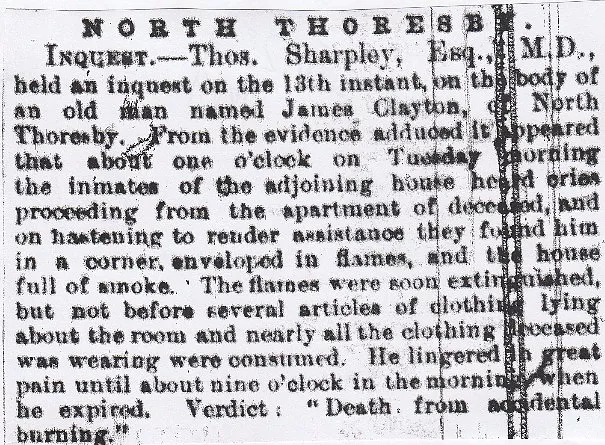
22/ North Thoresby, January 1886 (Concealment of Birth)
An inquest at the New Inn, upon view of the body of the new-born illegitimate female child of Alice Lingard, a domestic servant. The woman was a servant to Mr Thomas Bond of North Thoresby. When Mrs Bond came down one Sunday morning she found the girl poorly and in consequence of what she told her made a search, the result of which was the newly-born daughter. The infant was quite dead and the girl had no assistance in giving birth. A doctor was called for and she was attended by Dr George. Mrs Bond explained that Alice had been in her service for six months and when she found Alice in the kitchen and when asked “what was the matter?”, she confessed she had had a mishap in the closet. She sent her to bed then searched the closet and discovered the child’s body upon the soil. It was dead and cold. Dr George said he was summoned that day and saw the body of a female child in a bucket. It had been torn apart and asked for it to be placed on a board. It was six pounds and nineteen inches tall. The girl said it was born dead but the doctor said he doubted that was the case. The jury gave a verdict of “The body was found on the premises dead but there was not sufficient evidence to show that it was born alive”. (Found Thomas Bond in 1882 White’s Directory- he was a farmer, woolstapler, postmaster and grocer (Bond and Sempers)
February 1886
Alice Lingard aged twenty, a domestic servant, was charged with concealment of birth. Superintendent Stennett said he saw the girl on February 2nd, cautioned her against making any statement which might incriminate herself then read over the warrant for her apprehension. She said nothing and was taken to Grimsby in charge of a female attendant. The prisoner was then committed for trial at the next Assizes. Substantial bail:-two sureties of £20 being accepted.
23/ North Thoresby Fatality, April 1877
A dreadful accident occurred at North Thoresby that resulted in the death of sixty-four-year-old Anthony Stovin, when he was knocked down by a horse and dog-cart. Mr Stovin was nearly deaf and also mentioned his poor eyesight. He had been run over about a year ago but escaped serious injury. He had a history of accidents and near misses, about fourteen in all. The son said that he had seen him at the wood sale at the Granby Inn, the same evening as his accident. When he heard his father had been run over about an hour later, he was not shocked but went to the scene of the accident and knew he was dead. The driver said he was driving out of the Granby Inn and was going along, when he went to pass three men about fifty yards away, he called out “Heigh up”,and he turned the horse to side of the road when the shaft of the conveyance knocked him on the head and he fell down. Dr George examined the body and found a wound about an inch a half long on the back of his head. He died from concussion of the brain. The verdict was “Accidentally Killed”.
24/ North Thoresby, August 1863 (Accidental Death)
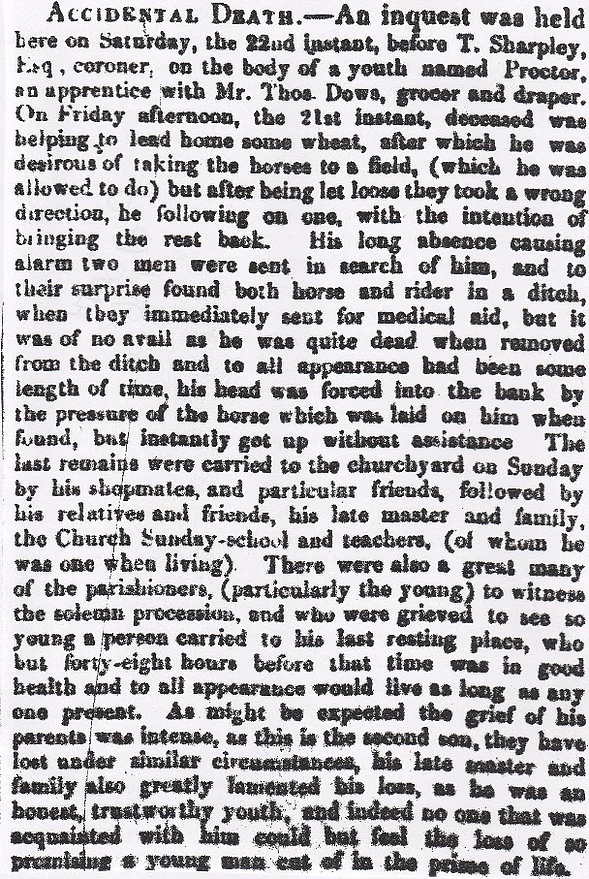
25/ North Ormsby near Ludborough, January 1876 (Suffocated to Death)
Edward Martin aged 16, was found in bed by a fellow workmate in a state of insensibility, and who died within half an hour of being discovered. John Briggs, a groom who worked for J.R.King of North Ormsby, said the two of them shared a room over the coach-house. They took some rakings from the fire put them in a scuttle and took them to their room. They were up for several more hours but could see the embers still glowing, but with no discernible smell coming from them. The next thing he remembered was someone giving him brandy to revive him. Edmund May, a blacksmith, went to call on the two of them but got no reply, so he got a ladder and entered the room. They were both unconscious with Briggs was making a gurgling noise in his throat. Briggs recovered but Martin died in less than half an hour.The verdict was “Accidental death caused by the carbonic acid gas emitted by the burning logs”.
26/ North Ormsby, (White Lady)
This tiny village near Ludborough has a statue of a lady in flowing robes, standing on the edge of a field overlooking the Lincolnshire Wolds. Supposed to be the site of where a young woman died in a riding accident, it was taken from Abbey Farm gardens and put in its present place a number of years ago. There is also an old airfield near Mill Farm that was used in World War One, only for a couple of years, as an emergency airfield used to deter the Zeppelins when they came over the East Coast.
27/ Nettleton, January 1904 (Drowning)
The son of the vicar of Nettleton near Caistor, Alfred B.Campbell, was brought up by a dredger in the River Teign in Devon. He was staying in Teignmouth and was seen on the Sunday evening after he left the service at the local church. The tide was at full flood and his watch had stopped at 7-20 p.m. Whether it was an accident or of a deliberate nature, police weren’t sure.
North Somercotes (Lively little place in Victorian times! Shipwrecks, Poisoning, Suicides, Bodies Washed up.)
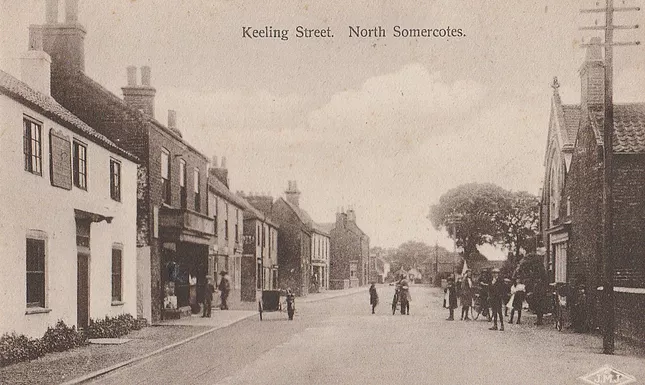
28/ North Somercotes, February 1909 (Accidental Shooting)
William Padderson was accidentally killed at North Somercotes while shooting stock doves. He went with two loaded weapons, a barrel went off and went directly into his head. A companion in another dugout, found him when he thought something was wrong, as the birds were flying around his place and no shots being fired.
29/ North Somercotes Suicide, October 1865
A labourer named Robert Limon killed himself one Monday evening due to his depressed state of mind at the time. He climbed into a tree and after fastening the rope to one of the highest branches, he placed it around his neck and threw himself from the tree. He was discovered early next morning by his father, who immediately cut him down. A verdict of “Temporary Insanity”.
30/ North Somercotes, (Fatal Accident), August 1883
A bricklayer by the name of Thoreley arrived back home one Saturday evening after being away for a couple of weeks and was told by his missus that birds had incessantly been pecking at his corn, so he went to borrow a gun from a neighbour. He left it in the passage, fully loaded and ready for action. His twenty-one-year-old son spotted the gun and picked it up unaware that it was loaded, and the shot went straight into his mother’s back, causing instant death.
31/ North Somercotes/Donna Nook June 1861 (Lifeboat Deaths)
A tragic accident occurred, by which two men and a young boy lost their lives. A newly built lifeboat had been built at Grimsby for the coastguard at Donna Nook Station, and five men and a boy went out on a trial run. The wind was blowing from the North-East and the waves were unseasonably high when they were on their way back. About half a mile from the shore a sudden gust upset the boat and it capsized, throwing all the crew into the North Sea. Two swam ashore and a third was rescued by his daughter, who seeing his strength fading, rushed into the water and dragged him to the beach. Harris aged forty-seven, Andrews aged thirty-four, and the youth, Collins, all lost their lives. The boat is too long and narrow for coastguard service and it has taken three lives of brave men, to find this out. (Are they buried locally?)
32/ North Somercotes Drowning, January 1877
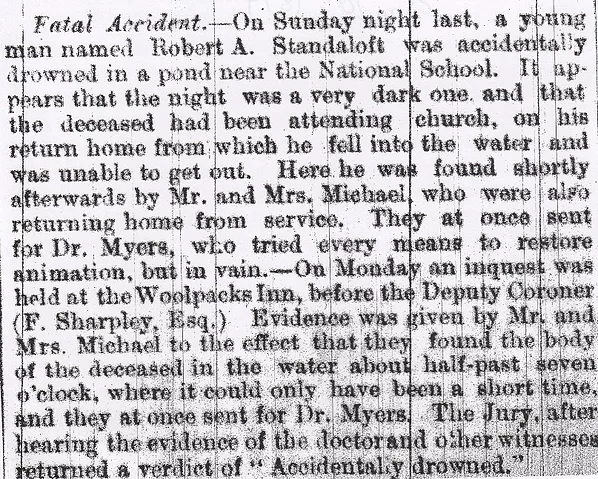
33/ North Somercotes, May 1879 (Hermit’s Suicide)
The local hermit of North Somercotes, Alan Lewis, who owned some acreage in the village, went out and hanged himself with a section of rope in an out-house. He was a sixty-year-old bachelor and kept himself to himself. His reclusive nature went as far as him eating a meal at a neighbour’s house then scuttling back to his own home and shutting himself away for the rest of the day. He had been in a desponding state recently and even looked a little poorly and pale. In a rare event, he went into Louth and went to a solicitor to have a will drawn up, then he went straight back to North Somercotes.
34/ North Somercotes, July 1880 (Body Washed Ashore)
On Saturday last, the body of a man was found after high tide, among the tufts of grass on the seashore near the ark. It was completely decomposed with the features having been eaten away. The body was taken by Sergeant Dale, and the clothes, boots and knife and fourpence in copper, were retained for identification if possible. The remains were too far gone for an inquest to be held and they were buried the next day. Nothing was known about the deceased and judging by the state of the corpse it had been in the water about three months, having been washed off some vessel.
35/ North Somercotes, September 1877 (Another Body Washed Up)
An inquest at the Bay Horse Inn on the body of a man which had been found on the sands on the previous day. Blythe Brooks, a labourer, stated that he was on the sands at 3-30 p.m. Monday afternoon with Charles Smith when they saw the body lying in a sand-hole with the legs and arms wide apart. He told the coastguard, and Smith went for his horse and cart and took the body to the Bay Horse Inn. The policeman searched him but found nothing in his pockets. John Lawson, the police sergeant of North Somercotes was present as the body was stripped. There were no marks on the body or on the clothing. He was about fifty years old, 5 foot 6 inches tall and fairly stout, with a grey goatee beard. He wore a brown cloth coat and vest, violet tie, cord trousers, grey socks, and cotton shirt. As yet remains a “John Doe”.
36/ North Somercotes Child Poisoning, August 1877
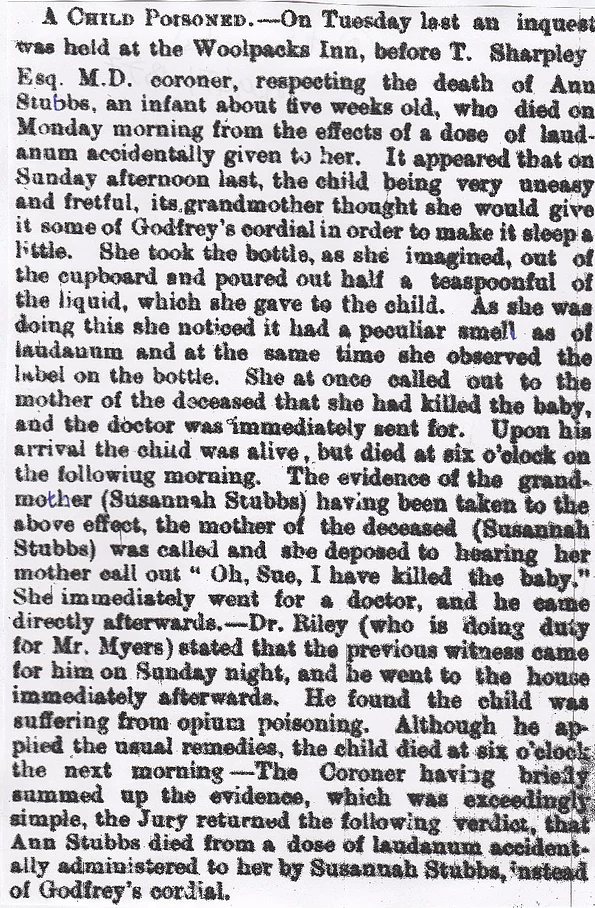
37/ North Somercotes/South Wales, August 1879
The twenty-eight-year-old son of the vicar was drowned at Mumbles near Swansea. Allan Blomefield went for a dip at 11-30 a.m., with the weather being warm and with the sea calm, with his two cousins, George Blomefield and Wilfred St Maur Hill, when out swimming they were caught in an eddy pool. George and Wilfred got to shore and told the coastguard to look for Allan. George was unconscious for nearly an hour. Three coastguard vessels were launched to search for him but he was not discovered until three a.m next morning in a deep whirlpool near the place where other casualties have previously occurred.
38/ North Somercotes Murder? January 1860
James Stubbs, a shoemaker, committed a brutal and savage attack upon his wife on January 12th. There was some disagreement between them during the day which led to a more serious quarrel at nine that night when Stubbs ejected his wife from the house and beat and kicked her in a ferocious manner. Her cries for help brought neighbours out to help her and they discovered her lying on the ground, apparently lifeless. A doctor was called for and she was taken inside. Mrs Stubbs was alive but had severe blows to her temple, and with her legs bruised and discoloured from her husband’s kicks. The woman is also in the latter stages of pregnancy and slight hopes are entertained of her recovery. Stubbs was arrested and taken to Louth Police Station. He was remanded for a fortnight with his wife too weak to undergo an examination. This wife-beating expert caused the death of a woman named Walker, with whom he cohabited about five years ago. He ill-treated her and on one occasion threw her on the fire and her back was severely burnt, the vertebrae being quite bare. She lingered for six months but ultimately died from injuries Stubbs had inflicted on her.
39/ North Somercotes, (Death by Burning) February 1878
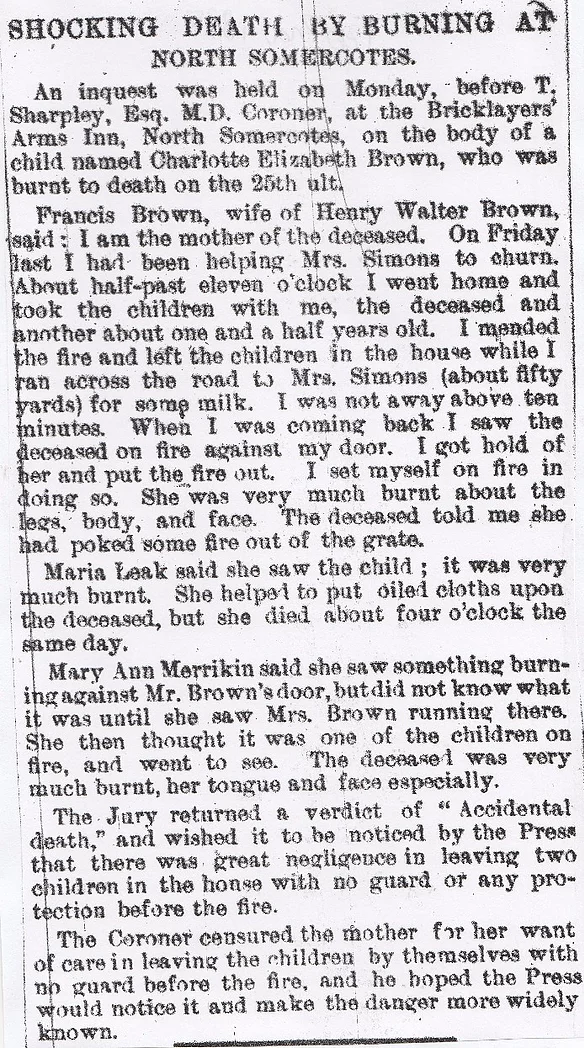
40/ North Owersby Suicide, July 1870
The untimely end by his own hand, of John Davy the highly respected agriculturist and ram breeder from Owersby near Market Rasen, occurred on Wednesday morning. He had been suffering from mental depression for the last two months and he took a gun into an out-house and discharged the contents into his head. His eldest son was married on Tuesday to Miss Marris of Orford near Binbrook, and this circumstance certainly intensifies the distress which has fallen on the united families. Mr Davy was a little over fifty years of age and well known all over the county. He cultivated 1600 acres of land and was an employer of much labour.
41/ Marshchapel Suicide, January 1869
Mary Neal aged 69 had been depressed for some time past, chiefly on religious subjects and that she had often told witnesses present that she wanted to destroy herself. On Monday morning, at 6-15 a.m., a person residing under the roof of the house in which deceased lived, heard her come down the stairs and walk out the door. At 6-45 a.m. she was found in a dyke in front of the house, which was only about three feet wide and ten inches deep. The jury gave a verdict of “Found drowned”, as it might well have been an accident and not a premeditated suicide.
42/ Marshchapel, July 1882 (Child Disappears)
A very sad occurrence happened at Marshchapel on the 21st July. A man named Thomas Johnson went down to the seashore to gather some cockles and took with him two of his children. In the afternoon one of the children, a little fellow aged about four years, strayed away from the cart and has not been seen or heard of since. He is supposed to have fallen down and was then washed away by the tide.
43/ Marshchapel Affray, October 1878 (English and Irish Scrapping)
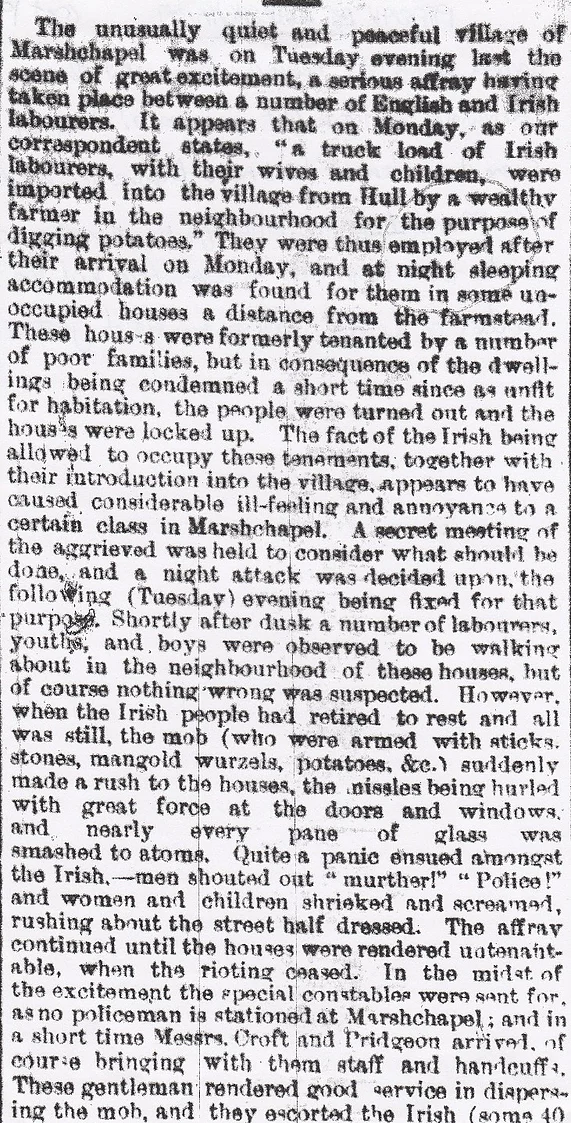
or 50) to a place of safety, most of their wearing apparel being left behind; they spent the remainder of the night in a barn! Such a scene of excitement has never before occurred in Marshchapel and although no arrests were made that night, it is expected that the leaders of the riot will be brought to justice.
44/ Normanby-by-Spital Suicide, December 1856
A well-respected farmer in the district of Market Rasen, a Mr Joseph Hardgreave, aged forty-six and from Normanby, who occupied 700 acres of prime farmland under the Earl of Yarborough, killed himself in the following manner. He rang the bell and the servant came along and observed him sat at the breakfast table, with a shotgun between his legs. He ordered some milk for his tea and before he had returned he seems to have tied the ends of his handkerchiefs to the triggers, then placed the muzzle in his mouth and given the handkerchiefs a tug with his feet and blown his head to atoms. Fragments of flesh and bone covered the walls and interior. He had no money worries.He was worth a handsome £30,000, and he leaves a wife and children.
45/ Middle Rasen Elopement, December 1870
A little sensation was created in Middle Rasen, by the elopement of a labourer’s wife with a married man of the same class. The affair was managed by the faithless wife with great craftiness. On the morning of the flight, she led her husband to believe that she was off to visit friends in Louth and got him to assist with her luggage etc. to Market Rasen. Upon the arrival in the Market Place she consulted the clock and kissing him meekly, said “Goodbye Iky! and God bless you! You had better go back now or you will be too late for work”. Iky went back; his wife joined her paramour and they went off by train. Neither have been seen since. The bereaved husband has broken up his home and gone into lodgings.
46/ Normanby-le-Wold, August 1862 (Inhuman Farmer)
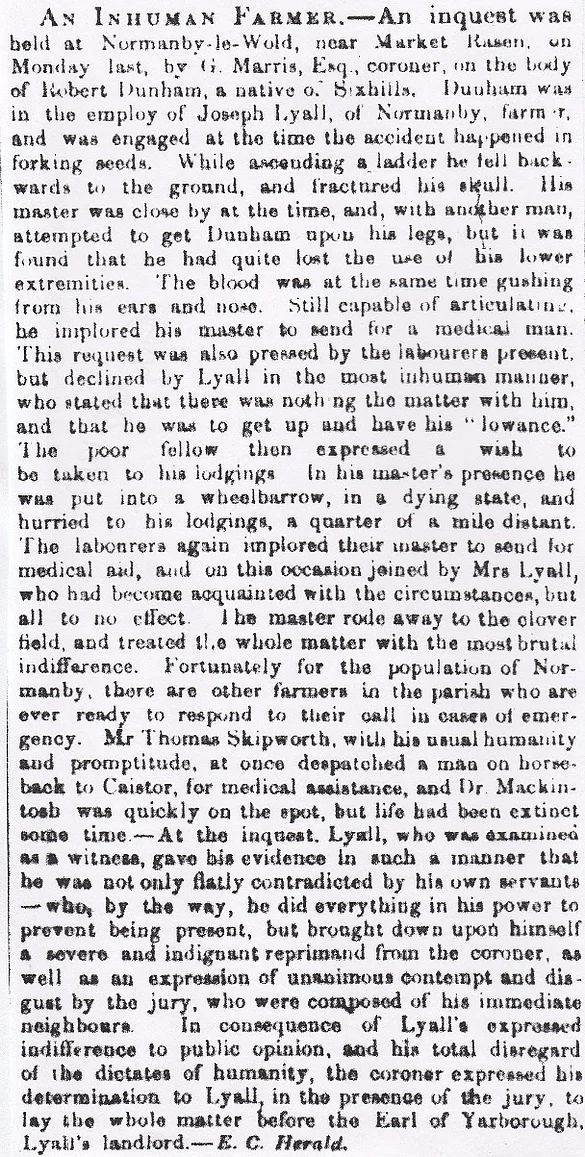
** Found Joseph Lyall on Gravestonephotos.com. Buried in St Peter’s churchyard in Normanby-Le-Wold. He was buried in 1862, the same year as this story, aged 69. Born in 1793.**
47/ North Cockerington, November 1888 (Body in Ditch)
The corpse of Mr Robert Hundleby aged forty, a farmer of Louth Park and North Somercotes, was found in a ditch in North Cockerington one Friday afternoon. It was in the ditch adjoining the public road leading from North Cockerington not far from the turn, leading to Red Leas. He had been to Louth Market and popped into the pub at the corner, known as Aylett’s Corner at about seven p.m.the night before. There were no marks of violence upon the body and his money and papers were found on him. The evidence seems to point to an accidental drowning. He fell in on the 7th November and was discovered on the 9th of November and was probably suffocated or drowned.
48/ North Cockerington, August 1878 (Child Drowned)
A painful death by drowning occurred at North Cockerington. Carter White Staines, a child of eighteen months old, was around about tea-time, missed by the other children and on a search being made his dead body was found by the eldest boy in a pond at the back of the stockyard. It seems that Mr.Charles Staines who has a family of nine children and up to Saturday last there had been a fence around the pond but it was removed for the purpose of thatching a stack of hay. The child was missed for only about ten minutes, and during that time had gone to play near the pond and then fallen in and drowned. “Accidental drowning”.
49/ North Cockerington Concealment of Birth, July 1866
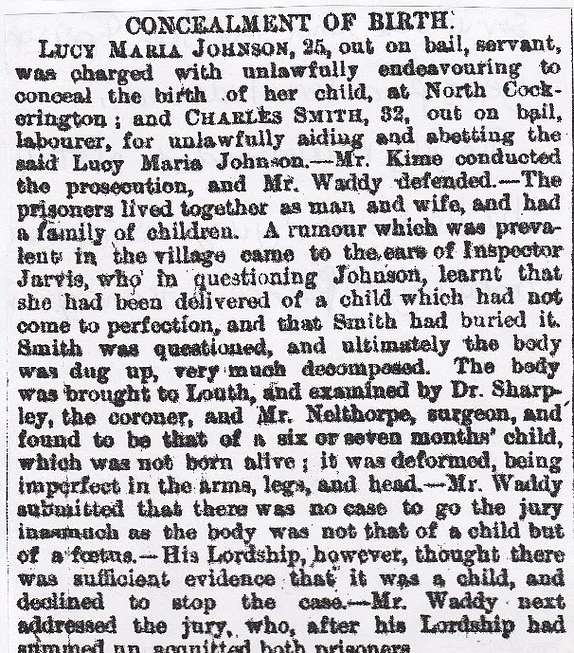
50/ Northorpe near Gainsborough, November 1880 (Railway Fatality)
The station is still there at Northorpe, now a private house I believe. This was a railway accident that resulted in the death of the driver and destruction of a large quantity of rolling stock. A down coal-train was standing within a few yards of Northorpe Station, engaged in shunting at the same time the down goods train was expected. The distance signal was against this train, which should have drawn up but due to heavy fog, this could not be seen until the driver had passed it. The driver slammed on the brakes, but he was on an incline down and pulling 36 waggons fully laden resulted in a collision. The engine of the approaching train telescoped the waggons of the standing train and mounted over the debris then fell over the bridge, sixteen feet below into a meadow. It took some hours to extricate the body of the driver, Nathan Priest. Two marvellous escapes were recorded though. The stoker named Gorton, when he saw they were going to crash he jumped at the telegraph wires and was fortunate to secure a hold, and hung there till the danger was past. A miner named Henry Hunsley, about to emigrate to America, missed the ordinary train and got permission to travel on the brake van of the stationary train. He had just sat down when he heard a whistle, looked out and saw the goods train approaching, he leapt out and ran down the embankment within a minute of the brake van smashing up into thousands of fragments. There was a five-hour stoppage while debris was cleared.
51/ New Bolingbroke Child Murder, March 1832
The wife of a labourer named Padley, who lived in the village of New Bolingbroke, became a mother and after a couple of days, while her husband was working in the fields, she threw the little bairn of the fire. Her husband returned later on and she came up with a far-fetched tale of how a beggar woman was spotted near the house and she feared that she had taken the child. The husband was suspicious of this feeble account of what happened and she admitted what she had done. The woman is on suicide watch and the infant was nothing more than a tiny pile of ashes.(post-natal depression?)
52/ Maltby-le-Marsh School Death, (Alford/Mablethorpe) June 1885
Samuel White aged thirteen years met with a terrible accident in the school playground. From the evidence of two or three play-mates of the deceased (who had left school and was working for his father who is a blacksmith at Strubby and Maltby) was going for dinner, when he stepped into the school ground. Here he was requested by some boys to give them a turn on the swinging pole. Whilst they were turning around, the pole snapped and fell upon the deceased. He was carried into the schoolroom insensible and in fact dead. The verdict of “Accidental Death”.
53/ Maidenwell, (Child Fatality) March 1876
Not a million miles away from Cadwell Park, the motor-racing circuit in the Lincolnshire Wolds. This is an all too familiar tale in the Victorian era, and four-year-old Harriet Carpenter was another sad victim. While her parents were gone temporarily she went downstairs and while trying to reach something on the mantelpiece, her nightdress caught fire. She was severely burned on the right arm and her chest, and soon after the poor lass died after suffering from agonizing pain.
54/ Maidenwell/Haugham Hill, June 1868 (Fatal Accident)
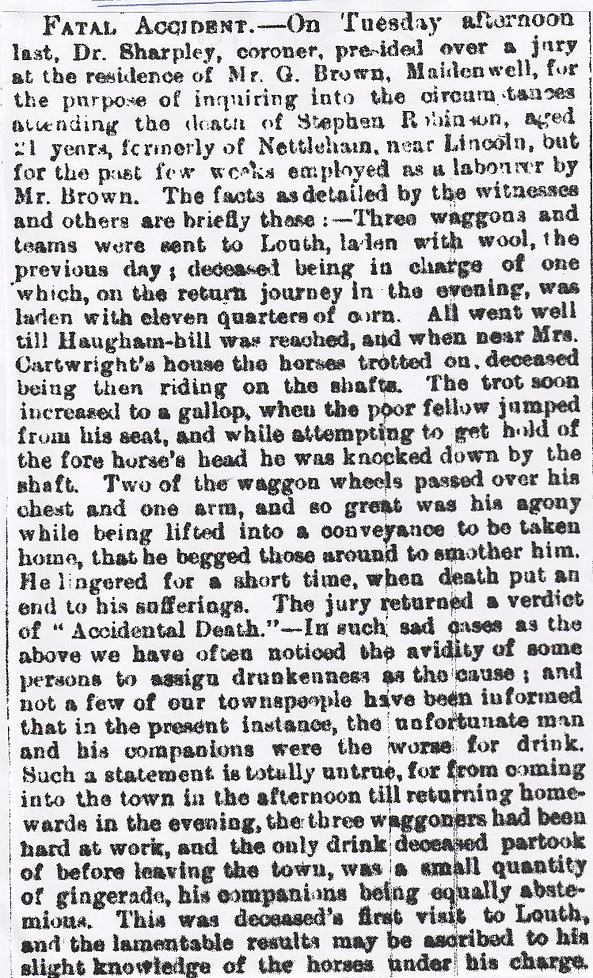
55/ Ruckland, (Human Remains) April 1875
Lying in a lovely valley, Ruckland is one of my favourite places in Lincolnshire. The tiny church of St Olave’s is one of the smallest in the county and is immaculately kept. Back to 1875 some small human bones and a portion of a brown skirt were found in a water cistern on the premises of Mr John Heanley, a farmer at Ruckland. The bones appeared to have been in the cistern for years and are supposed to be those of a child. The water has never been used for drinking purposes but merely for washing down vehicles etc. Inquiries have been made by the police but nothing as yet has transpired to throw any light on the matter.
56/ Ranby Suicide, (near Horncastle) October 1897
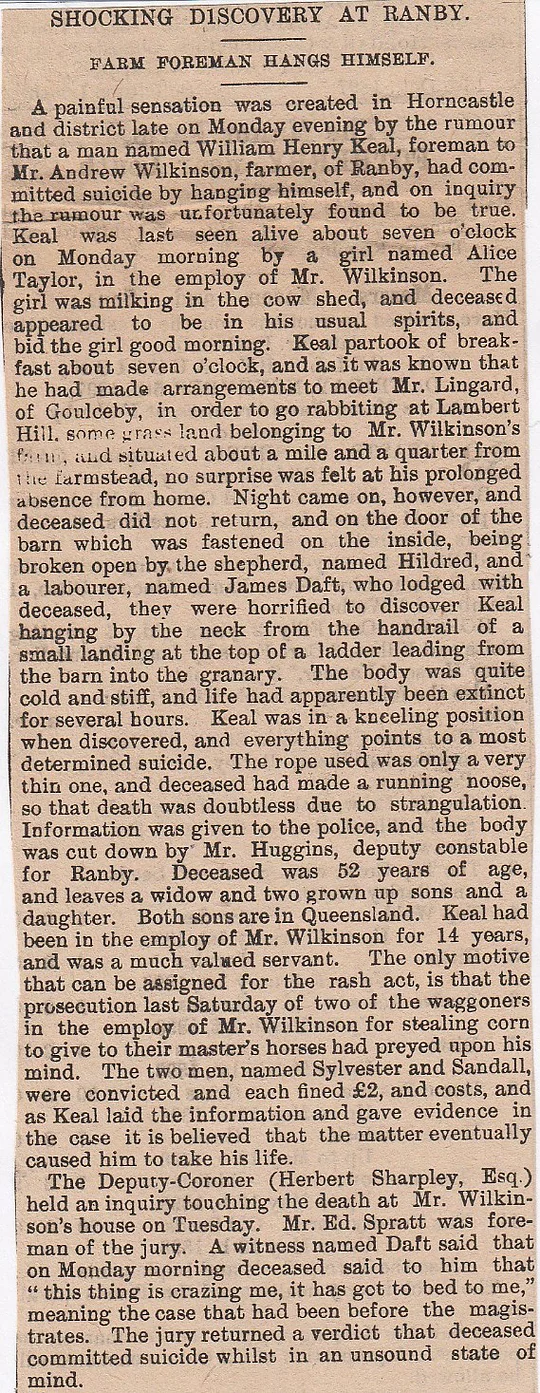
57/ Mumby near Alford, January 1893 (Vicar Vanishes)
The vicar of Mumby, the Reverend William Henry Jones, who is slightly rotund in stature and about forty years of age, sandy beard and moustache, blue eyes and about five feet six inches tall, had vanished off the face of the earth. He left Lincolnshire to see his solicitor in London, a Mr Pakeman of King William Street, and he booked into the Midland Hotel. He left his luggage and said he would come back later for it but he disappeared. There were two actions in which he was concerned that were to be tried at Lincoln, and now no trace can be found. (Where did he go?)
58/ Mumby Mill Fatality, August 1883
A sad accident which ended fatally occurred at Mumby Mill. The owner Thomas White aged twenty-seven, whose house is near the mill, walked round the side of the mill where the sails were at work and he was knocked over by a sail. He had just shouted for a man who worked at the mill to come down for breakfast. The boy thought they had struck something as there a jolt and rushed out and saw his master lying on the ground, bleeding from a large head wound. He was directly under the sails, which swung within three feet of the ground. He lingered a day or two but died without regaining consciousness. It was a verdict of accidental death but they thought the place was a danger to those working there and a fence should be erected. White had only recently purchased the mill and premises.
59/ Mumby, October 1861 (Dead Child Found)
The body of an unknown male child was discovered in Mumby by Inspector Wynne. The policeman said he had received information to go to the garden of Thomas Payne in the hamlet of Helsey in Mumby parish and examined the ditch round the garden. The tiny body was about a foot under the surface and wrapped in a handkerchief. The garden is about 200 yards from the nearest house and separated from the road by a grass field. Mary Ann Jarvis then spoke up and said she saw Betsey Grant with a newly-born baby on her bed. A thud was heard that day and when Mary Ann asked her if she was alright, she said she was fine and to make a cup of tea. The thud was the child dropping out. The child cried very weakly and appeared feeble. They tried to feed it and it had a spot of blood on it’s nose. Jarvis was told to nurse the child that evening but when she was going to take it, Grant said the child was dead. David Payne, the son of Thomas Payne, called on her and said he would bury the child properly. The post-mortem revealed no signs of violence, no broken bones or strangulation marks, so it was concluded that the little boy died naturally. Both David Payne and Betsey Grant were committed for trial for concealment of birth.
60/ Mumby Skeleton, October 1859
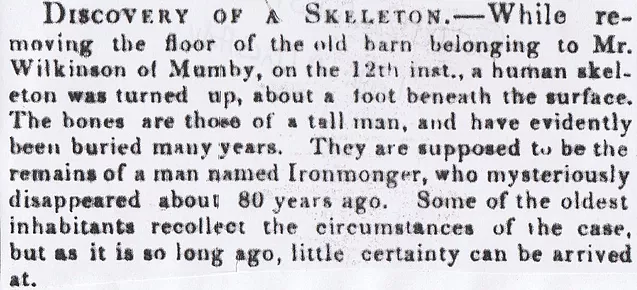
61/ Revesby/Mareham-le-Fen Murder, December 1862
Revesby Abbey nearby now does “ghost hunts”, might try one some time! This is about the body of Jemima Garner, an elderly woman who was exhumed and the contents of her stomach were tested for traces of arsenic poisoning. Yellow stains on the spine which was produced by the arsenic escaping through the stomach lining. Jemima was interred in December of 1861 and John Garner, her son and his missus, Elizabeth, were arrested. Witnesses told of how they ill-treated the old lady and when she was on her deathbed in terrible pain, John Garner didn’t give her anything to ease the pain, a tot of brandy or anything. He made it clear that she was being a hypochondriac and told her to hurry up and die. She asked for her son but he ignored her plea’s to see him one last time. There was alleged physical abuse as well, with Garner’s wife cursing at her and calling her all the names under the sun. Later on, in January of 1863, they were charged with her murder and Garner’s first wife, Hannah, was also to be exhumed and tested for arsenic poisoning.
62/ Mareham-le-Fen Poisonings, March 1863
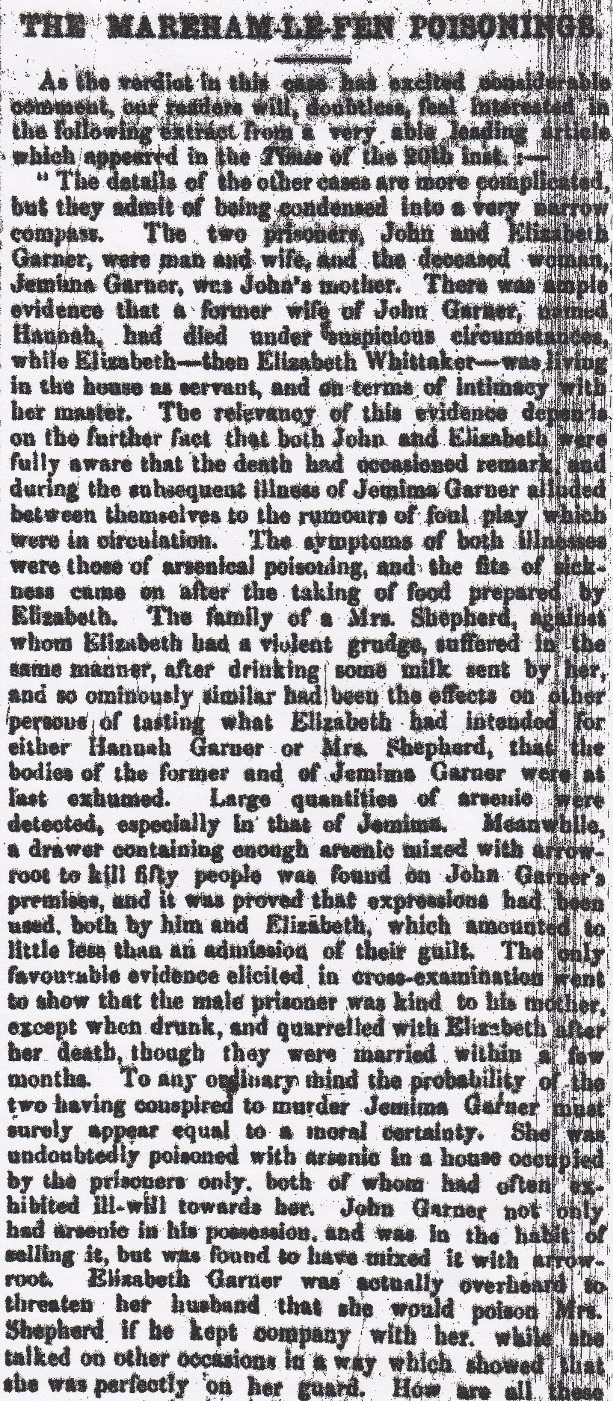
63/ Mareham-on- Hill, (Horncastle) December 1905 (Gun Accident)
A farmer by the name of John Empringham, at Mareham-on-Hill near Horncastle, was discovered dead in a field. He had been shot in the head and it is believed that cause of death was a tragic accident, by him trying to squeeze through a gap in the hedge and the gun going off, discharging its contents into his temple.
64/ Mareham-le-Fen Suicide, January 1881
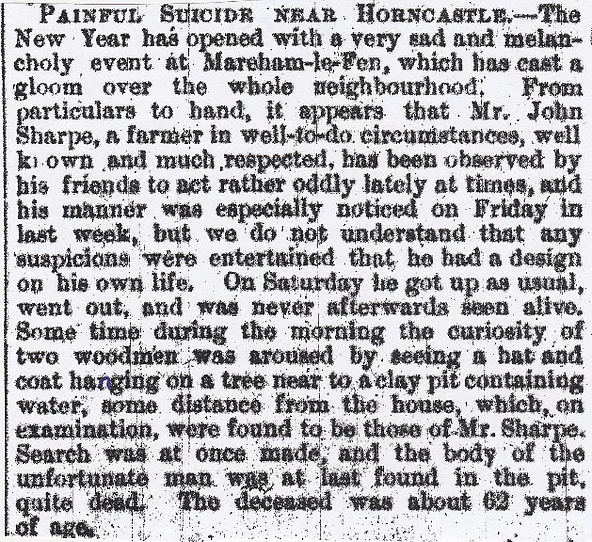
65/ Markby Suicide, November 1902


66/ Redbourne near Brigg, December 1888
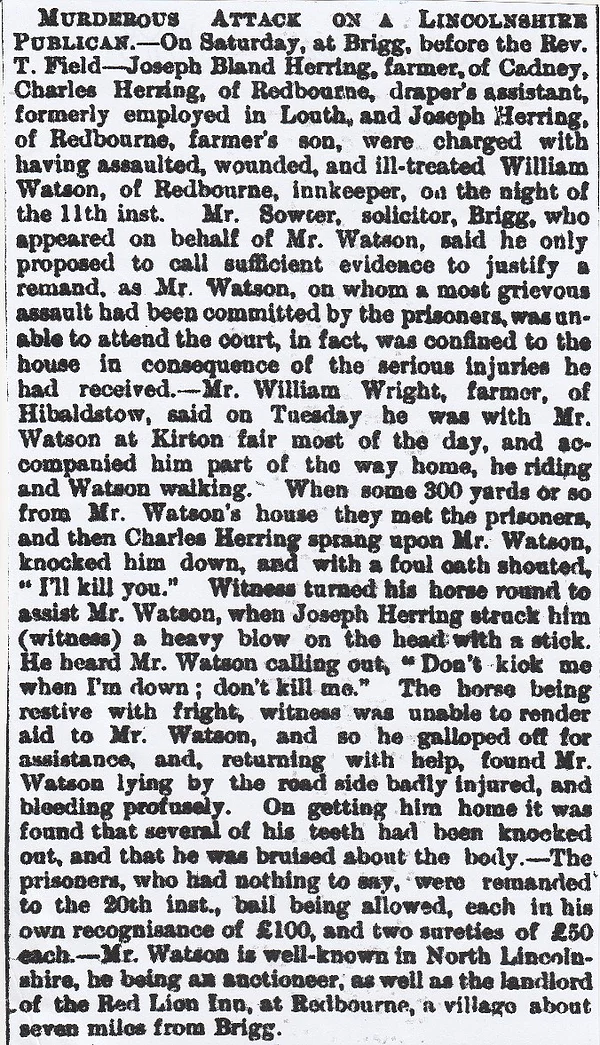
67/ Moorby, (Horncastle) June 1877 (Child Fatality)
An inquest was held at Moorby, on the body of Emma Chapman aged three years. Deceased had been last seen alive playing in the road on the previous day. Her elder sister lost sight of her for a few moments and on looking for her, saw her lying in a ditch close to their own cottage door. There was not much water in the ditch but the poor child had fallen on her face and when taken up, was quite dead.
68/ Middle Rasen Railway Suicide, April 1888
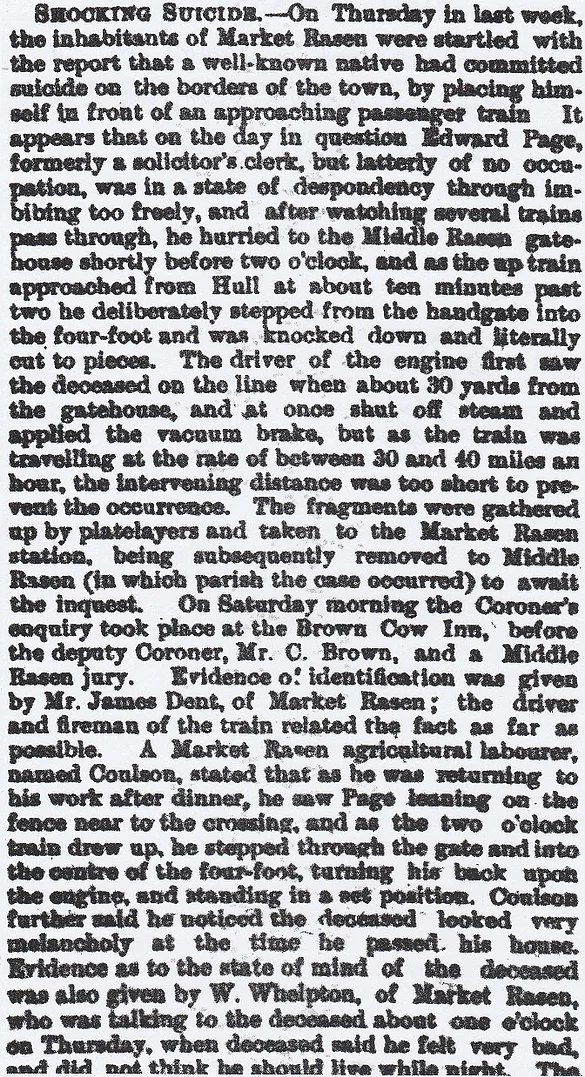
jury returned a verdict that the deceased committed suicide whilst in a state of temporary insanity.

